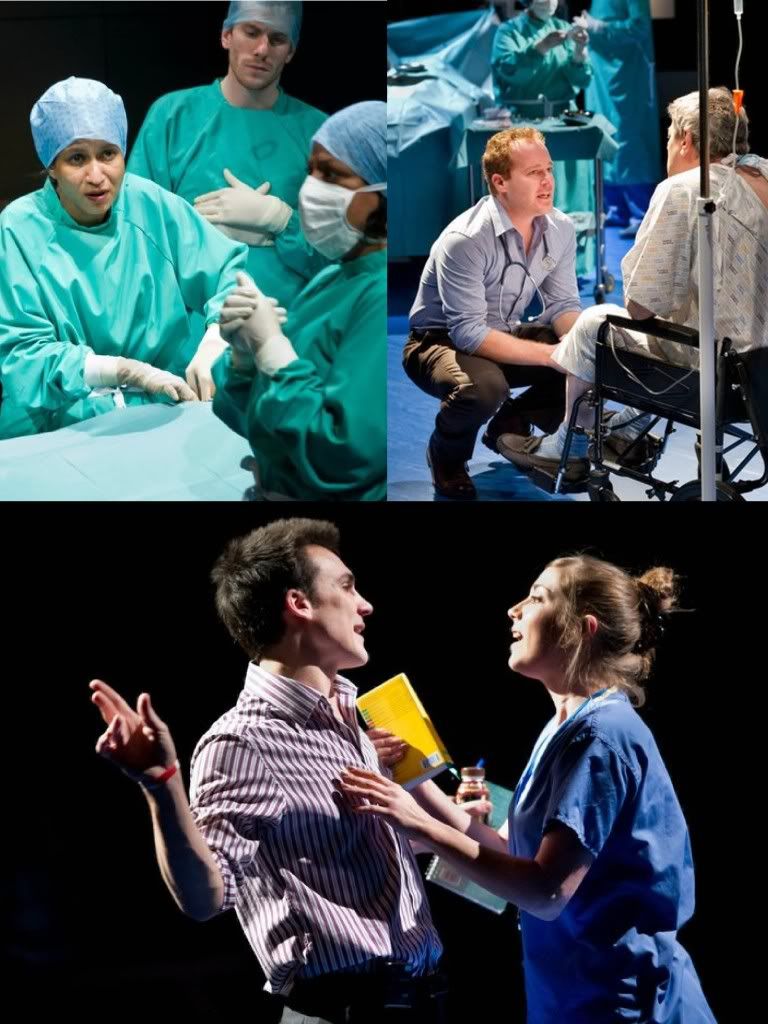Ah, Nina Raine is fast becoming one of my favourite new playwrights, I love the way her mind works and the way she uses words - so when I spotted that she was doing a play at the Hampstead Theatre I couldn't resist going and checking the theatre out at the same time (I liked it an awful lot). Though Tiger Country isn't a match for her Royal Court hit Tribes, I still think it has a lot to recommend it and contains a lot of the elements I really love in Raine's work.
I think one of the main problems with the play is one of familiarity - the setting of the piece, a hospital emergency ward is one we've seen again and again on the television and it does feel as you watch it like you've seen these stories so many times before and I don't get the sense that that Raine is particularly playing with these expectations we're left with. I don't get that sense of dissonance you sometimes get - when you're expecting one thing and given another. This deja vu hides a lot of the subtlety in the work and I do actually think there are some very clever ideas going on here. This is probably the play that has lingered with me the most since (though Lear is a close contender) - I keep finding myself replaying certain scenes in my head, musing them over and reaching for the ridiculously beautiful playtext. Particularly the scenes between young student Emily (Ruth Everett) and her mentor John (the endlessly delightful Adam James) and a late scene with her boyfriend James (Henry Lloyd-Hughes) which contained a moment that genuinely shocked me. Some of these have a sort of heart shuddering intensity and power that I loved. There are certainly four or five excellent scenes throughout the piece, which I think is pretty impressive for a relatively new writer.
Generally I seem to have liked the character of Emily a lot more than most the commentors I had read before seeing the play - I went in expecting to find a character joining a damaged team and curing their ills with their pure, uncynical heart - which I have a tendency to find a little frustrating. But actually I don't think that is what's going on here - it's much more Emily's journey, she's the one who's learning and by the end it's the team's approach she's adopted. However, the play doesn't treat the issue so simply - because we're also given the example of Vashti (Thusitha Jayasundera). Vashti's a fascinating character in her own right, her relationship with her Indian roots is incredibly interesting, but I do think we're at least partly meant to see her as an imperfect mirror for Emily. They're both driven, perfectionists, work orientated, have high expectations of others and are trying to fit into a man's world and with Vashti we're seeing the negative impact of accepting this approach to the work - it becomes both necessary and damaging for the people involved. Everett and Jayasundera do an incredible job with these two characters and thankfully they were more than ably supported by a really strong cast all around. Though once again Adam James was a bit of a show stealer for me.
The other difficulty with the play is that it does have a very large cast, the stories feel a little fractured and without the tighter focus of Tribes some of the issues get lost. But there is definitely interesting explorations going on with ideas of identity, alienation and othering - the sort of othering which we do both to ourselves and to others. We saw similar ideas in Tribes and thankfully, for me, they are ones I'm very interested in - though I didn't feel like I was able to pick through them enough here.
Production wise I really loved the traverse staging, between this, Salad Days and Prince of Denmark last year it's rapidly becoming a favourite. The set was simple but effective and allowed a lot of movement with the cast - which I found both a good and a bad thing. Bad mostly during the scene changes which were accompanied by a deal of meaningless rushing around and loud, slightly eclectic music - I think my reaction to this is probably based on the fact that I seem to have seen a string of these loud scene breaks and I'm feeling a bit tired of them. I had a similar problem in Three Sisters the next night, where the loud music was used to announce a change in scene but never seemed to reflect the emotional tone of the scene before or after, it was too abrupt. I generally like a more flowing change. It's a small complaint though compared to the overall effect - I even felt like I was getting a whiff of antiseptic at times, there was some clever set pieces when they were recreating medical procedures and I liked the use of projections to make these more understandable for the audience - I think that worked exceptionally well.
Definitely worth a look if you can find the time, though it's not perfect by any means.

No comments:
Post a Comment